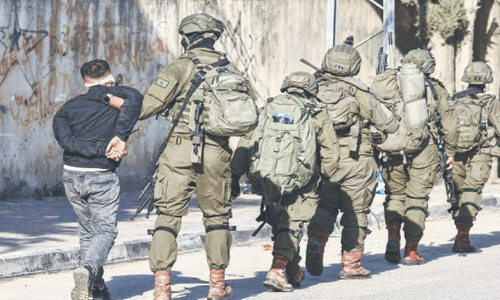SANGHAR: As peasants harvest the sugarcane crop under a bright morning sky, a road in Sanghar takes us to Jam Nawaz Ali taluka, the ancestral home of a former chief minister of Sindh, Jam Sadiq Ali. All the roads here are in such a poor condition that, as I’m told, private bus operators have suspended operations — even though Sanghar is one of the country’s largest cotton-producing areas.
This is the area from where Pir Sibghatullah Shah I, also known as Soorya Badshah, launched his armed struggle against colonial rule. He was later hanged by the British in Hyderabad jail. Legend has it that in one of this district’s urbanised talukas, Shahdadpur, is the tomb of Sohni and her beloved Mehar.
Today, though, a pall of unease can be noted in various parts of Sanghar. It has been the focus of the authorities’ attention since Oct 31, when 13 supporters and disciples of Pir Sibghatullah Shah, also known as Raja Saeen, custodian of the shrine of Roze Dhani in Pir Jo Goth, were killed in Khairpur in an armed clash at a polling station. Nine of them had been from Sanghar. The Election Commission of Pakistan (ECP) had to postpone the polling for the local government elections that had been scheduled for Nov 19.
Also read: 11 killed in Khairpur gunfight
The Hur Jamaat has a large following in Sanghar since Pir Sibghatullah I staged his rebellion. The British retaliated by setting up open-air jails, relates Allah Warayo Behan, who was as a child interred in one such place. Now over 70 years old, he says that today the Hur Jamaat people have a strong bond with the Pakistan Muslim League-Functional.
“Here, 80 per cent of the polling stations have been changed by the returning officers even though the Sindh High Court ruled that the polling stations of the 2013 general elections are to remain unchanged during these [local government] elections,” says Jam Madad Ali. Elated about winning a disqualification case in the apex court pertaining to PS-81 ahead of the local government polls against the Pakistan Peoples Party’s Asghar Junejo, he tells me the heirs of those killed in Khairpur were unwilling to even accept condolences, indicating the desire for revenge.
Stone-faced Raheem Bux, the brother of one of the victims of the Khairpur tragedy and a disciple of Pir Pagara, deplores the authorities’ attitude. “No one from the government has yet offered us condolences. While we are told to exercise restraint, others display weapons in the area in full view of the police,” he tells me at his Mari house in Khadro — a small town in Sinjhoro taluka — where four of the 13 victims were laid to rest on Nov 1.
The PML-F has been winning in successive polls in Sanghar, denying the PPP the district’s National Assembly seats until 2008 when Roshan Din Junejo got one. The Junejos wield considerable influence over the district which is the hometown of a prime minister to Pakistan, Mohammad Khan Junejo. Roshan is the son of Shahnawaz Junejo, widely respected among all.
Junejo has the distinction of winning one of Sanghar’s two NA seats for first time in 1988 for the PPP, beating former prime minister Junejo. After that, the PPP wasn’t able to win any NA seat till 2008 when Roshan Junejo — who was the PML-F-backed district nazim in the 2001 partyless local government polls and whose brother Mohammad Khan Junejo became the PML-F’s MNA in the 2002 polls — bagged NA-236, and then again in the 2013 polls for the PPP.
Besides Roshan, the PPP’s Shazia Marri won NA-235 in the by-poll after the PML-F general secretary, Sadaruddin Shah, vacated it in 2013. The PPP now has two of six provincial assembly seats, which the PML-F swept in the 2002 polls that were held under the Musharraf regime.
Electoral history shows that the PPP won two provincial seats of Sanghar out of five in 1988, and one each in the 1993 and 1997 polls. The PPP is poised to gain ground in a sustainable way and make inroads into Sanghar where all provincial assembly seats were denied to it in the 2002 polls. Obviously, this worries the PML-F, at one time a coalition partner of the PPP in Sindh. After the Khairpur tragedy, the PML-F looks set to capitalise on the sympathy wave.
Of a total of 696 polling stations, 550 have been rated as highly sensitive in Sanghar. “The police authorities have decided, as a preventive measure, to recommend a ban on the movement of some leaders and activists, and those reaching Sanghar from other areas,” says a police officer. If such a ban on movement of activists across districts had been in place, the Khairpur tragedy could perhaps have been averted.
Published in Dawn, November 17th, 2015

































